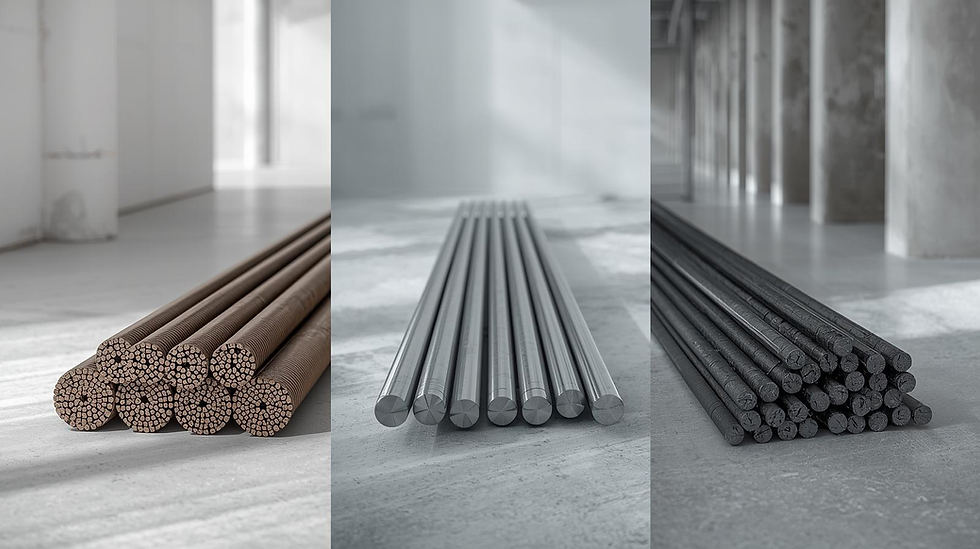How GFRP Rebar is Revolutionizing the Construction Industry?
- Kamal Sharma
- Mar 19
- 3 min read

Now you no longer need to rely on traditional materials to get your construction work done while facing the problem of corrosion and degradation afterwards. GFRP rebar is taking over the construction industry by storm. It is a modern building material that can offer better sustainability, durability, and cost-effectiveness.
Glass Fiber Reinforced Polymer or GFRP rebar is known to be very lightweight while providing incredible strength. Moreover, they are resistant to corrosion and other agents that degrade traditional materials like steel. In this blog, we’ll explore what GFRP rebar is, its advantages, applications, and its role in shaping the future of construction.
What Makes GFRP Rebar So Special?
GFRP rebar is a type of composite material that is made from glass fibers that possess high strength. These fibers are then embedded in a polymer matrix which is usually resin. Such a simple manufacturing process creates some of the toughest yet lightweight materials. Moreover, they also have incredible properties such as,
They are corrosion resistant, as they do not degrade in the presence of moisture.
They are as durable as steel while weighing a fraction of its weight.
GFRP rebar can maintain its integrity even in a very harsh environment.
The material can be customised to a project’s requirements.
Therefore, it is understandable why this material is so favoured in the industry. But this isn’t it, there are also other benefits that make GFRP such a great building material and an ideal choice for modern construction projects.
Advantages That Make GFRP Rebar Great
What is making various engineers and project managers turn to GFRP rebar for their construction work? One of the things that we have repeated many times, is the incredible strength-to-body ratio of GFRP. The weight of GFRP rebar is only a fraction of that of steel rebar while providing similar structural integrity. Moreover, they are also capable of many other things, let’s look at them:
Corrosion Resistance: One of the best features of GFRP rebar is its incredible resistance to corrosion, in particular, rust. Such benefit makes them ideal for construction that is in an environment that is exposed to moisture, salt, or chemicals.
High Tensile Strength: Their lightweight does not compromise on its structural integrity, as they come with high tensile strength. Furthermore, their tensile strength even exceeds that of the steel. Making them suitable for use in projects that require high load-bearing capacity.
Non-Conductive and Non-Magnetic: Another advantage that the GFRP has, is the property of not conducting electricity. As well as, not being affected by interference from magnetic fields. Thus, structures that are near sensitive electronic equipment or in environments where the electromagnetic field is strong can rely on GFRP.
Cost-Effective in the Long Run: We know that GFRP rebar may cost a bit more than a lot of traditional materials. However, it has a higher durability that lowers the maintenance cost in the long run. On the other hand, their lightweight makes them easy to transport and handle. This significantly reduces labour costs and the risk of on-site injuries.
Where the Use of GFRP Rebar is Seen?
As you can see, GFRP rebar is a versatile material that is applicable across a wide range of construction projects. For example, they are highly favoured in marine structures like piers, docks, and seawalls because of their resistance to saltwater corrosion.
Moreover, coastal area infrastructures also need them to withstand high humidity and salt exposure. Furthermore, GFRP have higher tensile strength with a lightweight nature. Making them ideal for bridges and tunnels, which need to be both light and structurally sound, respectively.
Thanks to their resistance to chemicals, they are non-conductive to electricity and magnetic field. GFRP rebar is often used in chemical facilities and structures that have sensitive electronic equipment like hospitals. Lastly, today, the use of this rebar is seeing an increase in foundations, walls, and other structural elements of residential construction.
Conclusion
Another reason why the industry is adapting the use of GFRP rebar is the sustainable characteristics of the material. Reduction in frequent repairs, having longer durability, as well as less pollution spread in its manufacturing. Thus, with wider adaptation and advancement in manufacturing process will also bring down the price as well. Such revolutionary features make GFRP rebar an industry favourite.



Comments